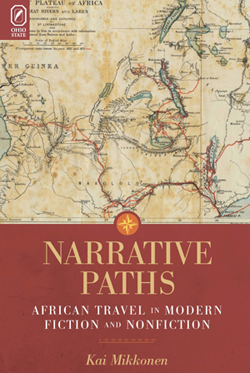Narrative PathsAfrican Travel in Modern Fiction and NonfictionKai MikkonenTheory and Interpretation of Narrative |  2/23/2015 LITERARY CRITICISM / European / English LITERARY CRITICISM / European / French 368 pp. 6x9  $80.95 cloth 978-0-8142-1274-5 Add cloth to shopping cart $29.95 paper 978-0-8142-5202-4 Add paper to shopping cart $29.95 PDF eBook 978-0-8142-7558-0 Add CD to shopping cart Shopping Cart Instructions Review/Change Shopping Cart & Check-out | |||
|
Table of Contents
Explore More Karen Blixen Museum (Rungsted, Denmark) Le Centre de Recherche sur la Littérature des Voyages (CRLV) |
“There is much to admire in Kai Mikkonen’s extended analysis of the travel writing and fiction of Loti, Céline, Gide, Leiris, Simenon, Cendrars, Conrad, Greene, Waugh, and Blixen. Narrative Paths: African Travel in Modern Fiction and Nonfiction makes a valuable contribution to an often neglected but quite appealing genre by demonstrating that travel narrative appropriates devices from fiction to portray ambiguity of voice and perspective. The insights on the interconnectedness between an author’s travel writing and his or her fiction give us strategies for approaching both genres as well as reasons to question the assumptions on which both genres are traditionally founded.” —Deborah Losse, professor emerita of French and former Dean of Humanities, Arizona State University “Mikkonen’s Narrative Paths is a valuable contribution to the Theory and Interpretation of Narrative series, due in particular to its focus on literature written in languages other than English and on nonfictional genres. Mikkonen’s French corpus, moreover, has the merit of including authors like Pierre Loti and little examined texts like some of Simenon’s journalistic writings.” —Philippe Carrard, Dartmouth College In Narrative Paths: African Travel in Modern Fiction and Nonfiction, Kai Mikkonen argues that early twentieth-century European travel writing, journal keeping, and fiction converged and mutually influenced each other in ways that inform current debates about the fiction–nonfiction distinction. Turning to narratives set in sub-Saharan Africa, Mikkonen identifies five main dimensions of interplay between fiction and nonfiction: the experiential frame of the journey, the redefinition of the language and objective of description, the shared cultural givens and colonial notions concerning sub-Saharan Africa, the theme of narrativisation, and the issue of virtual genres. Narrative Paths reveals the important role that travel played as a frame in these modernist fictions as well as the crucial ways that nonfiction travel narratives appropriated fictional strategies. Narrative Paths contributes to debates in narratology and rhetorical narrative theory about the fiction–nonfiction distinction. With chapters on a wide range of modernist authors—from Pierre Loti, André Gide, Michel Leiris, and Georges Simenon to Blaise Cendrars, Louis-Ferdinand Céline, Joseph Conrad, Graham Greene, Evelyn Waugh, and Isak Dinesen (Karen Blixen)—Mikkonen’s study also contributes to postcolonial approaches to these authors, examining issues of representation, narrative voice, and authority in narratives about colonial Africa. Kai Mikkonen is associate professor of comparative literature at the University of Helsinki in Finland. | |||

